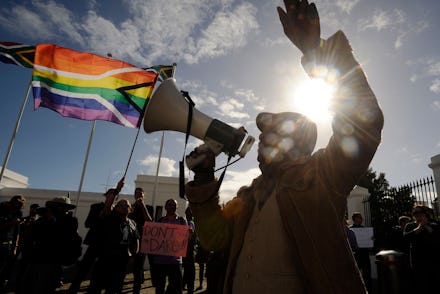South Africa Just Sent a Powerful Pro-Gay Statement to the Rest of the Continent

South Africa just took a bold step forward for gay rights on the continent — and most people around the world probably missed it.
South Africa legalized same-sex marriage in 2006 and has long allowed gays to serve openly in the military. However, its neighbors have not been so quick to embrace same-sex equality. Given this environment, news that South Africa had appointed its first mixed-race lesbian to the nation's cabinet is not only a big deal, but is also a bold statement signalling that progress is slowly, but surely, coming to the region.
South Africa's post-apartheid constitution actually does afford the LGBT community more legal rights than many other nations. Yet the social fabric and mores of this nation have complicated the community's acceptance.
In a 2013 Pew Research Center poll, 61% of South Africans believed that society should not accept homosexuality. This is comparably better than, but not too distinct from, other nations in the Sub-Saharan region, which overwhelmingly disapprove of homosexuality: "At least 9 in 10 in Nigeria (98%), Senegal (96%), Ghana (96%), Uganda (96%) and Kenya (90%) believe homosexuality should not be accepted by society."
Image Credit: Pew Research Center
The recent re-election of social conservative and traditional Zulu polygamist Jacob Zuma is a further testament to the social climate of acceptance of the LGBT community. While he has not taken action to overturn certain LGBT rights, he has not voiced his support of them either. Nor has he publicly condemned the homophobic atrocities occurring throughout the region in Nigeria and Uganda.
All of which is why the appointment of Lynne Brown as the public enterprises minister as the first openly LGBT figure is, indeed, such a big deal. A former teacher, Brown was premier of the Western Cape until her party lost control of government.
Brown seems a demure, no-nonsense figure who is said to like reading and playing golf in her time off.
"I'm not a flamboyant type of person; I get things done," she said, according to the Guardian. In another interview, the 52-year-old described herself as a "gentle politician" who has "not developed a hard skin but I do not care what people say about me — that you learn."
In a country where homophobia and sexism strongly are still a large part of the culture, her appointment is significant and symbolic.
Steven Friedman, director of the Center for the Study of Democracy, told the Guardian: "I think it's worth drawing attention to. She's not a gay rights campaigner — it's not recognition in that sense — but the fact that under the most socially conservative president since 1994 there is the first openly gay minister in such a position is significant."